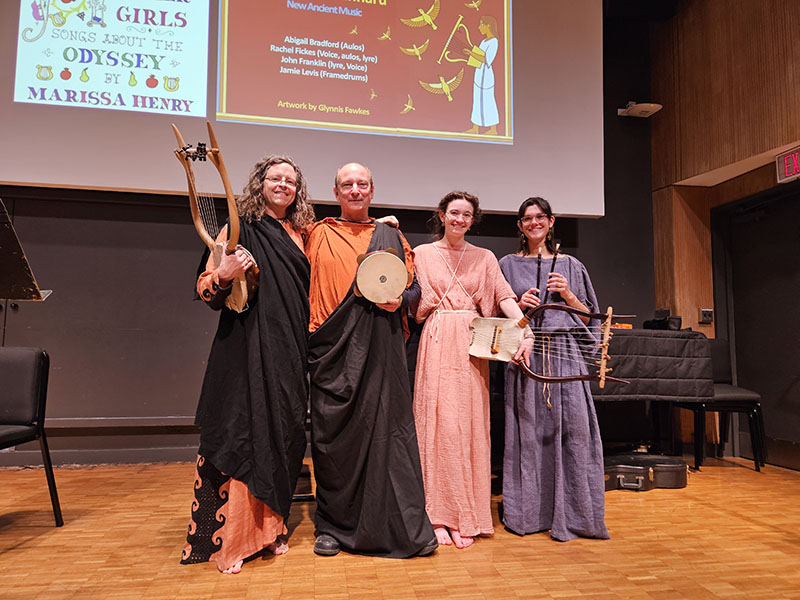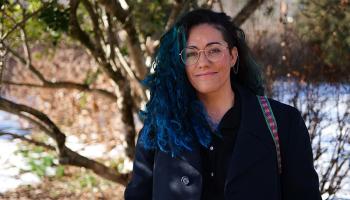Graduate Student’s Research Uncovers the Soundtrack of Ancient Democracy

For Abigail Bradford, a Ph.D. candidate in the Program in Mediterranean Art and Archaeology at the University of Virginia, studying ancient Greek music isn’t just an academic exercise — it’s a musical journey through a distant era…one with a few similarities to our own.
Bradford’s research explores how a genre of ancient Greek music known as “New Music” was visually represented in fifth-century BCE Athenian vase painting. Her work connects shifts in musical performance to political changes in democratic Athens, offering a new lens on the cultural transformations of the classical world.
“What I’m arguing is that the changes happening in Athens in actual musical practice in the fifth century B.C. are visible in Athenian pottery,” Bradford said. “We can look at images to track these changes very closely.”
Bradford’s research draws on a wide range of sources, from archaeological sites in Greece to ancient musical notation. It even led her to learn to play the aulos — a double-piped reed instrument featured prominently in ancient Greek art. The experience has played an integral part in helping her bring life to the musical practices of antiquity in ways that are rarely seen in traditional scholarship.
“I’ve been integrating music back into my research in a literal way by learning and performing on an ancient Greek instrument,” she said. “That has opened up new ways to connect with my subject.”
Her innovative approach to scholarship has drawn praise from leadership in the College and Graduate School of Arts & Sciences.
“Abigail’s scholarship exemplifies the strength and vitality of the graduate student community in Arts & Sciences at UVA,” said Christa Acampora, dean of the College and Graduate School of Arts & Sciences. “She combines rigorous research with creative, interdisciplinary inquiry and opens new conversations in her field and beyond the academy. We are truly fortunate to have Abigail’s talents and passion advancing our research and teaching missions.”
Ancient Music and Its Modern Parallels
Bradford’s academic journey began at the College of William & Mary, where she earned a degree in classical archaeology and environmental science in 2017. As an undergraduate, she worked in curatorial studies and helped develop exhibitions at the Muscarelle Museum of Art in Williamsburg, Virginia, and the interests she cultivated there in material culture, sound and storytelling now inform her work as a doctoral candidate.
She also spent a transformative year in Greece as the James Rignall Wheeler Fellow at the American School of Classical Studies in Athens. There, she participated in intensive site visits, gave presentations and worked with fragments of ancient instruments in museum collections.
“I still travel to Greece every year,” Bradford said, “but spending an entire academic year there was life-changing — visiting archaeological sites, seeing ancient artifacts firsthand and connecting with scholars from around the world.”

Her time abroad deepened her appreciation for ancient performance culture and further informed her dissertation, which analyzes musical iconography on Greek pottery in the context of education, theatrical performance and musical contests. In each case, she explores the social and political significance that music and musical innovation play.
“There was a genre in ancient Greece called ‘New Music’ — young, hip musicians pushing boundaries, and traditionalists absolutely hating it,” she said. “It’s the same story we see repeated with jazz, rock, and rap. It’s a human pattern.”
Bradford has also found creative ways to share her research with broader audiences. With support from UVA’s Religion, Race, and Democracy Lab, she produced a podcast titled “Fresh Beats from Snoop to Euripides,” drawing connections between ancient and modern musical revolutions.
“When I talk about my research, people immediately connect it to their own musical experiences,” she said. “It’s fascinating to see how innovations in music, whether in 500 B.C. or today, always provoke similar reactions.”
Reimagining Research and Scholarship
Bradford's passion for making ancient music accessible also shapes her teaching. This year, Bradford is leading a self-designed course at the University of Mary Washington titled “Archaeology and Sound.” In the class, students investigate the music of ancient civilizations and complete multimodal final projects, including making podcasts and building instruments.
“I want my students to have the freedom to explore research in different ways,” Bradford said. “Some are writing traditional papers, but others are creating podcasts or reconstructing ancient instruments for their final projects.”
While her work meets and exceeds traditional academic expectations, Bradford is committed to broadening the scope of what scholarship can be. She is currently working on completing a written dissertation, but she also aspires to demonstrate the value of alternative forms of research that can include performance and multimedia.
“There’s a traditional mode of scholarship that we just accept — writing dense academic papers — but I find the most rewarding scholarship to be interactive,” she said. “Whether it’s performing ancient music or using podcasts, these forms of engagement resonate with people in a way that a written dissertation often doesn’t.”
With plans to return to Greece this summer and long-term goals of teaching and continuing her research, Bradford is excited about the possibilities her work presents.
“Music in ancient Greece wasn’t just about entertainment,” she said. “It was deeply embedded in education, theater and even politics. It encompassed poetry, philosophy, and instrumental performance — far more than we think of as ‘music’ today.”
We’re here to answer your questions! Contact us today.








